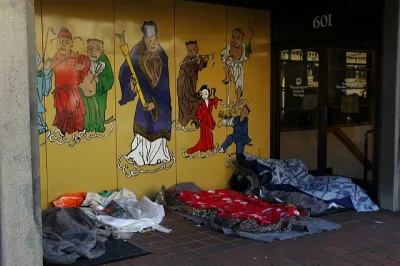It’s "dramatically higher" than any number under discussion, and not even close to what the city will raise with its new tax on large businesses.

Monday, the Seattle City Council passed a measure that will tax large businesses (those that gross more than $20 million per year) $275 per employee per year; though the amount is less than it was in the original proposal, the implementing the "head tax" will raise an estimated $45 million to address the very serious housing crisis in the region.
It’s not a small sum, but it’s a fraction of the $400 million the consulting firm McKinsey recently estimated that the city would need to spend to house all its homeless citizens; that number, writes David Kroman at Crosscut, is “dramatically higher than any dollar amount under serious discussion either in Seattle City Hall or in King County Council chambers.”
“In addition to the dollar estimate,” Kroman goes on, “the report found strong correlation between rising rents and the rising homeless population.”
Seattle is only one of many American cities with very high rents and an increasingly number of people unable to afford them, and only one of several that have tried to find new revenue streams or additional funds to address the issue.
FULL STORY: The pricetag to solve homelessness: $400M a year, new estimate says

National Parks Layoffs Will Cause Communities to Lose Billions
Thousands of essential park workers were laid off this week, just before the busy spring break season.

Retro-silient?: America’s First “Eco-burb,” The Woodlands Turns 50
A master-planned community north of Houston offers lessons on green infrastructure and resilient design, but falls short of its founder’s lofty affordability and walkability goals.

Delivering for America Plan Will Downgrade Mail Service in at Least 49.5 Percent of Zip Codes
Republican and Democrat lawmakers criticize the plan for its disproportionate negative impact on rural communities.

Test News Post 1
This is a summary

Test News Headline 46
Test for the image on the front page.

Balancing Bombs and Butterflies: How the National Guard Protects a Rare Species
The National Guard at Fort Indiantown Gap uses GIS technology and land management strategies to balance military training with conservation efforts, ensuring the survival of the rare eastern regal fritillary butterfly.
Urban Design for Planners 1: Software Tools
This six-course series explores essential urban design concepts using open source software and equips planners with the tools they need to participate fully in the urban design process.
Planning for Universal Design
Learn the tools for implementing Universal Design in planning regulations.
EMC Planning Group, Inc.
Planetizen
Planetizen
Mpact (formerly Rail~Volution)
Great Falls Development Authority, Inc.
HUDs Office of Policy Development and Research
NYU Wagner Graduate School of Public Service





























